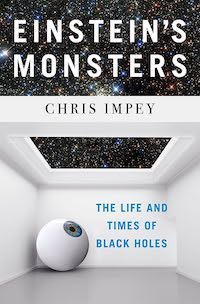Einstein's Monsters: The Life and Times of Black Holes
It’s very easy to forget that we rely on indirect information. The universe is full of matter: dust grains, gas clouds, moons, planets, stars, and galaxies. We don’t see this matter directly; we infer its properties by the way it interacts with electromagnetic radiation. Chemical elements are diagnosed by the particular spectral lines they emit or absorb. Dust grains reveal themselves by absorbing light and emitting infrared radiation. Moons and planets are seen in the reflected light of nearby stars. Stars are seen by the radiation they leak out as a byproduct of nuclear fusion. Galaxies are mapped using Doppler shifts of spectral lines from their gas and stars. All of this is indirect, and it only relates to the 5% of the universe that’s normal matter. The 95% that’s dark matter and dark energy is still invisible to us because it doesn’t interact with radiation. The astronomical objects are the actors, but the “stage” for this cosmic drama is also unseen.
Einstein’s Monsters is a good introductory book to the history and progression of humanity’s understanding of black holes.
One of the things this book does surprisingly well is to not overemphasize the creative possibilities that black holes and infinity produce. Even the most fundamental facts about black hole are insanely impressive and often overshadowed by talk of multiverses and other such things in other books I’ve read. While those what ifs are cool to consider, I’ve found other books focus on those at the expense of the fundamentals. To be fair, that probably sells better. The fact this book doesn’t do that is appreciated.
The book is well-written and easy to breeze through. Complexity wise, the book is not too simple to be boring for fans of space, but also not too complex to be a significant challenge. I suspect this is a good sweet spot for a book like this.
I highly recommend this book.
